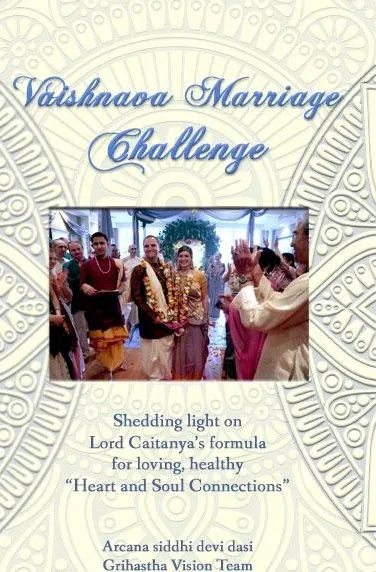5 Tips For A Happy Krishna Conscious Marriage
By Madhava Smullen | Май 29, 2021

According to the Grihastha Vision Team, “The quality of our relationships determine the quality of our lives.” And according to Srila Prabhupada in a July 10th, 1969 letter, “To marry and to become an exemplary householder is the ideal life of Krishna consciousness.”
So how do we have a happy, Krishna conscious marriage?
To find out, we interviewed Partha Das and Uttama Dasi, members of the Grihastha Vision Team (GVT), a group of Vaishnava couples and professional counselors and educators who help ISKCON devotees have healthy marriages and happy families.
Uttama and Partha are also themselves a happily married couple who are about to celebrate their 50th wedding anniversary this June – so they know what they’re talking about!
Spelling out the acronym HEART, and derived from the third verse of Sri Chaitanya Mahaprabhu’s Siksastakam, here are their top five tips for a happy Krishna conscious marriage:
1. Humility
Seek first to understand and then to be understood. Listen attentively, show interest, and be present. Admit mistakes, make amends.
Humility, Partha Das explains, is extremely important in communication. “Generally, in our communications, we tend not to listen,” he says. “When our significant other is speaking to us, we tend to have an internal dialogue going on while we’re listening. And within our minds, we’re thinking of our point of view and how we can counter their point of view. That’s not actually communication. So humility means, I can take my point of view, put it down on the table next to me, and actually listen to my spouse’s point of view, even though I may not agree. I can listen, I can validate them, and I can let them know that I fully understand why they think the way they do, even though I might not agree. And similiarly, they can do the same for me.”
When each partner understands the other, problems in a marriage become very easy to manage or solve. “There’s a large body of research that shows that when couples simply understand each other, a lot of their problems practically disappear,” Partha says. “Because generally, what amplifies a challenge into a major problem or conflict is that the partners don’t feel understood or loved. And when you understand each other in a loving exchange of communication and humility, even though you disagree, it becomes miraculously much easier to navigate challenges.”

Adisvari Dasi and Ananta Vasudeva Das
2. Empathy
Be compassionate and reach out to help in some way.
This simple action, of reaching out to help, is in itself the method for developing empathy, according to Uttama Dasi.
“It really helps you to develop new and better ways of communicating, when you display empathy by thinking, ‘Okay, maybe I feel hurt, maybe I feel attacked, but the other person must be under some distress also. They must be hurting. So what can I do to help?’” Uttama says. “And when we reach out in that way, it’s impossibleto be harsh – we will naturally start to develop kindness and gentleness.”
Such a practice of reaching out, finding your partner’s need, naming it and empathizing with it, therefore, goes a long way in de-escalating situations where someone feels hurt.
3. Appreciation
Focus on the good qualities in your spouse and others. Express appreciation and gratitude.
“Appreciation is a Vaishnava quality,” says Partha. “Srila Prabhupada’s books are filled with so much appreciation for Krishna. And our Godbrother Bhakti Tirtha Swami used to say that we should develop the attitude of gratitude.”
Words of appreciation add to a couple’s “emotional bank account,” Partha explains. “When couples have a large balance of appreciation in their bank account, the inevitable negative withdrawal doesn’t seem so impactful in the bigger picture. But when couples who have a very small account of appreciation in their relationship have a withdrawal in terms of a negative activity, it becomes very noticeable.”
Research has shown that if a couple has an appreciation versus negative exchange ratio of less than five positive interactions to one negative, they can veer very quickly towards separation or divorce. A healthy marriage, meanwhile, might have 20 to 50 or more positive interactions of appreciation to one negative interaction.
“Words of appreciation from our spouse let us know we’re doing the right thing, and nurture both of us doing more of the things that make our relationships work,” Partha says. “So it’s very important for couples to a) to have that attitude of appreciation, and b) also to express it on a regular basis.”

Grihastha Vision Team mentee couple Monohara Govinda Das and Kriti Prada Dasi in England
4. Respect
Believe in your partner’s sincerity to be the best person they can.
As well as pointing out that our Vaishnava theology tells us we should respect all living entities, Uttama and Partha quote an article from the Harmonist magazine, attributed to Srila Bhaktisiddhanta Saraswati Thakura, which states that both a man and a woman seeking to marry should “choose for their partners only such persons who serve God better than themselves.”
Mutual respect despite your differences, Uttama explains, gives a relationship the dynamic to work through all inevitable challenges.
“Respect means we’re always there and attentive, because we respect what the other person has to say or to offer,” she says. “We respond to the other person’s requests for our attention. We are present when they speak.”
Respect also means avoiding becoming overly familiar. One of the ways to do this is to apply tip #3 – having an attitude of appreciation.
Another important element of respect in a marriage is to understand when one’s spouse is having a difficult time, for instance due to stress or illness, and to respect that they want to be the best person they can, but that something may be preventing them from being so in the moment.
“If we can just reach out, and help them find what’s missing, then we can go back to having good interactions,” she says.
Finally, Uttama points out the importance of having self respect, as a part and parcel of Krishna who is there to serve Him. “If we have proper self respect, then that decreases our need for demanding respect from our partner, so that we are able to be respectful,” she says.
5. Tolerance
Up to 69% of marital disagreements may not be solvable, but can be managed. Change the things that can be changed. Accept the things that can’t be changed. Pray for the wisdom to know the difference.
Tolerance is another important Vaishnava quality, emphasized by Sri Chaitanya Mahaprabhu.
“In the beginning of a relationship, it’s like, ‘everything’s perfect, we’re in heaven,’” Partha says. “Then, over time, couples begin to discover their differences. And then they begin to discover that some of the differences are annoying. And then they start to both think, everything would be perfect if the other person changes.”
“Some things about our nature can change,” he continues. “And some things cannot — they’re just our inherent nature. And so that’s a very important juncture in marriage, where couples really need to work on developing that spiritual quality of tolerance. And it’s not just gritting your teeth. Some couples will do that. They come to that stage in marriage, and they’re committed, they stay together, and they grit their teeth, but they’re not happy.
“So tolerance actually means to accept the differences and to honor them. And when we can honor the differences with respect and humility, then tolerance becomes tempered by love. Tolerance tempered by love becomes patience. And it’s a lot easier to be patient than to grit your teeth. So that is something that’s very important for couples to see – that those differences are there to help you learn to develop that loving patience.
“Of course, when the underlying motivating factor is love – and I’m talking about the love of a Vaishnava serving another Vaishnava in the service of Krishna – then tolerance has a very different meaning in that true Vaishnava context.”

The cover of Vaishnava Marriage Challenge, by Grihastha Vision Team member Arcana siddhi devi dasi
Conclusion – Healthy Vaishnava Marriages Can Help Us Improve the Quality of Our Lives and Progress in Our Devotional Service
“The quality of our relationships really determine the quality of our lives,” Uttama says. “And that’s why we should put effort into having good relationships.”
She adds: “We see that in Vaishnava marriage relationships, many of us are able to deal more easily with our anarthas [unwanted weeds on the creeper of devotion]. Because when you’re in a close relationship, the spotlight goes on your anarthas, and you have no choice but to deal with them. So if we can do that in a loving, safe relationship, it becomes so much easier to get rid of all our anarthas, so that we can advance nicely in devotional service.”
To read more about Lord Chaitanya’s formula for loving, healthy “heart and soul connections,” purchase Vaishnava Marriage Challenge by Arcana Siddhi Devi Dasi here: https://www.amazon.com/Wise-Love-Bhakti-Search-Soul-Consciousness/dp/0996915613
For a devotional guide to marriage, service and love, read the Grihastha Vision Team’s book “Heart and Soul Connection” here: https://www.amazon.com/Heart-Soul-Connection-Devotional-Marriage/dp/153064271X
Find video resources for a healthy Vaishnava marriage here: https://www.youtube.com/channel/UCoL2KI76rF4e14_sU0iIYQw/playlists















